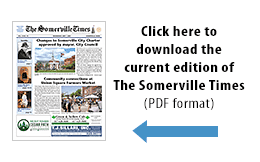 By William C. Shelton
By William C. Shelton
(The opinions and views expressed in the commentaries of The Somerville News belong solely to the authors of those commentaries and do not reflect the views or opinions of The Somerville News, its staff or publishers.)
When I heard an advertisement promising that a personal hygiene product would “empower” the user, I knew that another concept had reached the end of its life cycle. The cycle begins when the experience of some group produces a genuine insight.
Others who interact with the group repeat the concept. Mainstream media pick it up. By the time that it’s used to market commodities, it has lost the power to convey the original insight.
To eulogize “empowerment,” I want to tell you what it meant to me.
Each of us is a complex and powerful creation. From time to time we get hurt. Most of us have some aspect of ourselves where we got hurt so much, where things got so hard, that we gave up. We redirected our attention to areas where we could make a difference and feel hopeful.
Some of these injuries are peculiar to our individual biographies. We sustained others because of our class, culture, gender, appearance, or sexual preference.
We don’t think of ourselves as hopeless because we don’t pay attention to the aspect of ourselves that we abandoned, and we experience success in those areas where we do focus.
When circumstances force us to confront what we’ve lost, we may feel something like hopelessness. Or the fear, or grief, or anger that caused us to abandon this aspect of ourselves.
If we are fortunate, what we have abandoned is minor. A friend can’t dance. Another is convinced she can’t sing. Another has math anxiety.
Some of us did not grow up so casually. The parts of ourselves that survival obligated us to abandon are so extensive that we have difficulty making a living or sustaining relationships. Nor can we successfully redirect our attention away from these injuries. Because they are so central to human existence, it is difficult to get through a day without having experiences that evoke shame, hopelessness, or isolation.
We may numb out shame with addictions; combat hopelessness with violence; and overcome isolation by forming gangs that contradict a culture that values success in endeavors where we feel incapacitated. Yet beneath the geological layers of hurt and defenses, our talent, power, passion and intelligence remain intact.
Empowerment is the process of reclaiming them. We empower each other when we create opportunities to heal from hurt, set aside defenses, and work productively, love effectively, sing, dance, solve equations.
A pervasive loss that effects all, whether we grew up casually or in the streets, is loss of faith in our ability to make a difference by working together. It comes from so many past experiences that we don’t notice it anymore. Though false, it forms the taken-for-granted reality in which we dwell. And it becomes self-fulfilling.
As an individual, we cannot bring new jobs to Somerville, or expand our open space, or reduce the ultrafines that we breathe (http://www.thesomervillenews.com/archives/4045). So for work and leisure, we own a car. In turn, our car contributes to the congestion that puts off some employers and creates our need for escape.
As one family, we cannot transform our school system. So we move to a suburb, unraveling the fabric of relationships that provide security and nourish civic action.
One reason why this loss of faith in collective effort is so pervasive is that isolation is embedded in each experience that disempowered us. If when we were hurt, others had been present who were effective and resolute in their commitment to us, the hurtful experiences would have simply become wisdom. Instead, there was either no one there, or withdrawal from those present was our best option.
If these hurtful experiences are caused systematically, then to end them we must work together to change that system. The collective action that this requires seems to have declined greatly over the last three decades. So many young people have never experienced it. And its absence requires us to manage socially created problems with make-do individual solutions.
Collective efforts such as bringing the Green Line here, improving public education, and enriching our parks and youth activities are making Somerville a refreshing exception at the local level.
The disempowering experiences that formed part of our past do not have to be part of our present. At any time we can give and receive the attention, commitment, and cooperation that empowerment requires.
I will if you will.
The Immigrant Professionals series will be back with the next column.















Reader Comments